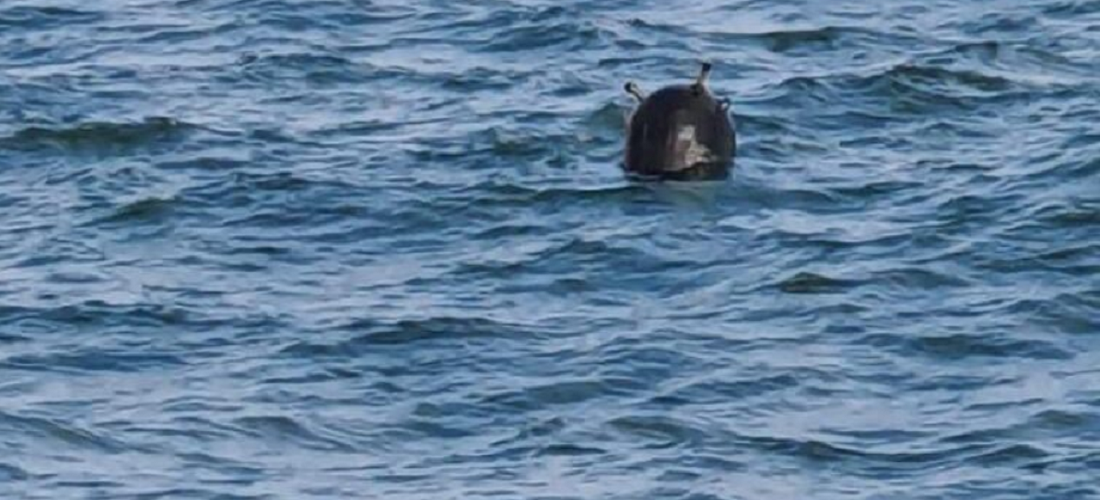
Naval mines threaten Black Sea trade routes
Apr, 05, 2022 Posted by Gabriel MalheirosWeek 202214
Black Sea coastal countries found floating naval mines and deactivated them. Russia and Ukraine accuse each other of having placed the explosives.
The Turkish navy said it neutralized several floating sea mines since last weekend. One of the mines was decommissioned near the Bosphorus Bosphorus Strait, which was briefly closed to shipping.
The Romanian Armed Forces also claim to have exploded a floating device discovered by a fisherman off the country’s coast earlier this week. These appear to be anchor mines, which mimic buoys. They, however, do not float on the surface of the water but rather just beneath it. An anchor supports the mine’s floating body underwater using a cable to conceal it. The explosive device detonates when in contact with the hull of a ship.
Hundreds of mines or just ten?
Earlier last week, the Russian FSB secret service and the Moscow Defense Ministry issued a warning about floating Ukrainian sea mines broken loose from their moorings by a storm off the coast of Odesa. Initially, there was speculation of hundreds of roaming mines. Then, the Russian Defense Ministry rectified the information: approximately 10 of the 370 explosives actually broke free. Ukraine quickly dismissed this as phoney information.
Ukraine claims that the explosive devices discovered are, in fact, Ukrainian designs. However, they assert that these mines would have come from the Crimean peninsula, Russia has occupied since 2014. According to Kyiv, Russia is deliberately letting mines float across the Black Sea in order to damage Ukraine’s reputation. “Both versions are factually plausible,” says Johannes Peters, a maritime security and strategy expert at the University of Kiel.
He says the published photos show that the bombs are old models, presumably from Soviet production, with Ukrainian markings. The Turkish authorities confirmed the same information. However, it is also clear that the Russian navy also had access to such mine no later than the annexation of Crimea.”
Sea mines are not prohibited weapons, though the two warring parties accuse each other of violating international humanitarian law. Unlike landmines, there is no international treaty banning sea mines. But the Hague Convention, which forms part of international humanitarian law, binds its use to specific rules which prevent mines from being left adrift in international waters.
On the other hand, it is permissible to place fixed sea mines in one country’s own territorial waters during a crisis and armed conflict to protect against attacks. However, “any form of mine employment requires the observance of certain principles like effective surveillance, hazard control, and warning signing,” says the German Defense Ministry.
When Ukraine mined a vast area of coastal waters in the Black Sea’s northeast, it explicitly warned vessels. In theory, under the Hague Accord, Kyiv should have also issued a warning about any explosives that had been broken loose.
Civil navigation under pressure
Following the destruction of one of the mines discovered on the Bosphorus by the Turkish Navy, Turkish officials also prohibited night fishing in the Black Sea until further notice. The Bosphorus, as part of the connection between the Black Sea and the Mediterranean, is an important trading route for all bordering states except Turkey. However, it is currently also a bottleneck for wheat shipments from Russia and, more broadly, from Ukraine.
The maritime route restriction might contribute to the rise in wheat prices. The crisis in Ukraine has put a strain on many shipping companies: the Association of German Shipowners (VDR) believes that at least 60 ships from foreign commercial fleets are trapped in Ukrainian ports. The use of sea mines aggravates this issue. We are really concerned,” Gökhan Özcan of the Turkish shipowners’ group Kosder told the Turkish daily Dünya. He said he gets a lot of inquiries from partners, especially from Mediterranean nations, asking if they can dare to take their cargo ships through the Bosphorus.
In addition to fearing for their crew, shipowners also fear financial risks as brokers refuse to insure war damage. Shipping companies, therefore, act at their own financial risk when they send vessels to Romania, Moldova, Bulgaria or even Russia and Georgia.
Can old mines still be dangerous?
Even though the danger appears to be much lower than initially assumed, with only a quarter of the first suspected number of mines freed, one might still ask how dangerous old explosive charges are. “According to the images, the mines are in disrepair, and some do not appear to be armed,” adds naval specialist Peters. “However, that doesn’t imply there isn’t any danger.”
In fact, their age and the saline environment they float can cause detonators to be triggered by the slightest contact, including with pockets of air. Therefore, Peters warns that the danger should not be underestimated: “mines are and remain big balls full of explosives.”
Source: O Povo
To read the full original article, please go to: https://www.opovo.com.br/noticias/mundo/2022/04/04/minas-navais-ameacam-rotas-comerciais-do-mar-negro.html
-
Grains
Apr, 25, 2022
0
Palm oil export ban by Indonesia leaves buyers with no plan B
-
Ports and Terminals
Jul, 20, 2022
0
Port of Suape performs record vehicle transshipment operation
-
Shipping
Sep, 21, 2021
0
Japanese company to launch ammonia-powered cargo ship by 2026
-
Meat
Feb, 16, 2024
0
Paraguay sends first shipment of fetal bovine serum to the United Kingdom

